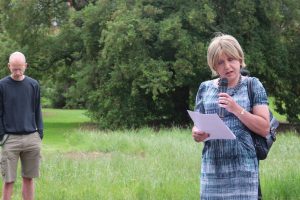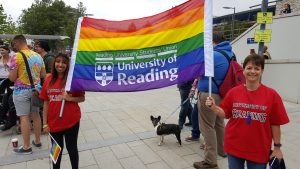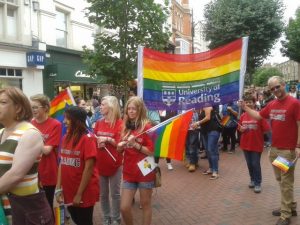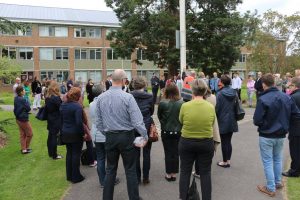Eleanor Roberts, a representative from the transgender support group The Beaumont Society, visited the University of Reading on May 17, 2016, to stand in solidarity with the University community on International Day Against Homophobia, Biphobia and Transphobia. As part of her visit Eleanor delivered a speech at the flag raising and we are grateful for her kind permission to reproduce the text of this below.

Eleanor Roberts speaking at IDAHoBiT 2016 at the University of Reading (credit: RUSU)
READING UNIVERSITY: IDAHoBiT 2016
I gave this speech at Reading University at their flag-raising event to commemorate the 2016 International Day Against Homophobia, Biphobia and Transphobia (IDAHoBiT), held on May 17th each year. Eleanor Roberts, BS Southern RO.
Why are we here today? Why do we need this day with its focus on anti-LGBT hate crime? Because our country still has a long way to go to ensure that prejudice against LGBT people is eradicated totally. Such irrational phobias are a blight on our society and a blight on our lives, and today’s focus ensures that all of those individuals who have suffered in any way because of this vile and irrational hatred have not done so in vain; and also to reinforce our belief that such unacceptable and unjustifiable bigotry has no place in our society.
So who and what are our enemies in this campaign to give ourselves the right to express our own individuality?
Prejudice, intolerance and bigotry obviously, and the people who actively promote such archaic and vicious hatred.
But also the curiously British desire for compromise, the wish not to upset some of the less tolerant social groups, the concept that important legal principles that uphold human rights and human dignity should play second fiddle to maintaining good relations with some of the more intolerant minority groups in UK society.
I’ll give you an example from a rather different sphere:
Twelve years ago the UK and French governments both introduced legislation outlawing the practice of FGM, Female Genital Mutilation. A friend of mine who does voluntary work for one of the main anti-FGM charities told me two years ago of her anger and frustration. The French government had decided on a zero tolerance approach almost from the word go by instigating criminal proceedings against parents who organised the cutting of their daughters. So there the practise was largely eradicated within a few years. What happened in the UK? Very little. The law was not used. No prosecutions were made – in case community relations were upset. The result? Hundreds of young girls continued to have their lives ruined by being taken out of the country in order to be cut. Doesn’t it make you want to weep in frustration? Only in the past year or two have moves been made to tighten procedures in the UK. Too late for the girls mutilated in those intervening years.
For our LGBT community, in the 90s and the early years of this century, we had clear examples of LGBT-phobic bigotry occurring within our society, even within universities and colleges, often by religious and cultural minorities, as well as by stupid, ignorant individuals. And too often the authorities took a compromise view in seeking a “solution” that they hoped would satisfy both “sides“. But there cannot be two “sides” when a crime has been committed, when clear prejudice and intolerance is voiced, when someone from our community has been grossly insulted, frightened and humiliated, even physically attacked. Thankfully the Equalities Act of 2010 has given us the clear legal backing that should have always been there. The individuals and groups who express crude intolerance towards LGBT people need to be dealt with quickly and sharply by the authorities, whoever those bigoted individuals are, whichever religion or social group they claim to represent.
Extreme prejudice is not a part of our open society. Indeed, it is one of the main obstacles of a truly open society. I certainly recognise the progress that has been made over the past decade or more in the acceptance of Trans people in everyday life. But we still have a long way to go. We cannot lower our guard.
At every incidence of intolerance towards LGBT people we need to be prepared to remind society and the institutions involved that the law is clearly and unequivocally on our side, and needs to be seen to be operating. We welcome the fact that many of our police forces have made progress in this regard. They deserve our thanks for what they’ve achieved following the 2010 Equalities Act, with many forces appointing equalities “champions” who’s role is to change heavily ingrained attitudes. We now need to make use of their changed approach towards our community; we need to report every single phobic incident to them to be logged so that they, and the Home Office, have a clear idea of the level of intolerance we still face. If derogatory, anti-LGBT comments are made to you on campus, in the street, out and about in your everyday life then report those incidents to your local police. But please don’t put yourself in unnecessary danger from the perpetrators of such hate crimes by unwise direct challenge if the circumstances are against you.
I’d like to read you some of the extracts from the December 2015 Commons Select Committee report on Transgender Equalities, the most recent official publication that sets out a vision for the next few years. Although the report clearly focussed on trans issues, many of the stated principles apply across the LGBT spectrum. Maria Miller MP, the committee chair, writes
- Fairness and equality are basic British values. Parliament established this Committee to provide the opportunity for on-going focused scrutiny of where fairness and equality are not yet a reality of day-to-day life. A litmus test for any society that upholds the principles of fairness and equality is the extent to which it supports and protects the rights and interests of every citizen, even the most marginalised groups.
Whilst Britain has been among the countries that have gone furthest in recognising lesbian, gay and bisexual rights, our society is still failing this test in respect of trans people, despite welcome progress in recent years.
The report goes on to say:
- High levels of transphobia are experienced by individuals on a daily basis (including in the provision of public services)—with serious results. About half of young trans people and a third of trans adults are reported to have considered suicide.
- With Regard to Hate crime: Legal changes are critical, but they will only bite if there is cultural change too—by society but also by those who enforce the law. The Ministry of Justice must ensure that it consults fully with the trans community in developing the Government’s new hate-crime action plan, so that the proposals are well-targeted and likely to be effective in increasing levels of reporting. This plan must include mandatory national transphobic hate-crime training for police officers and the promotion of third-party reporting.
The report I’ve just quoted recognises the relentless pressures that trans people face in their everyday lives. No wonder this year’s focus for IDAHoBiT is on mental health issues. But I want to remind everyone that being trans is, itself, not a mental health problem. It is the constant pressures from prejudiced individuals and parts of society that lead to anxiety, stress and depression.
Finally from me: Maybe there will come a day, possibly sooner than we expect, when we will no longer need days such as this on our calendar. But for now we need to be watchful, we need to log and report incidents and we need to remain organised.
My organisation, The Beaumont Society, is a registered charity run entirely by volunteers, and has been in the forefront of support for trans people for exactly 50 years. We’ve seen a massive change in attitudes in that half century, but there is still work to do. On behalf of the society, I’d like to thank Reading University and its Student Union for giving me the opportunity to speak today.










